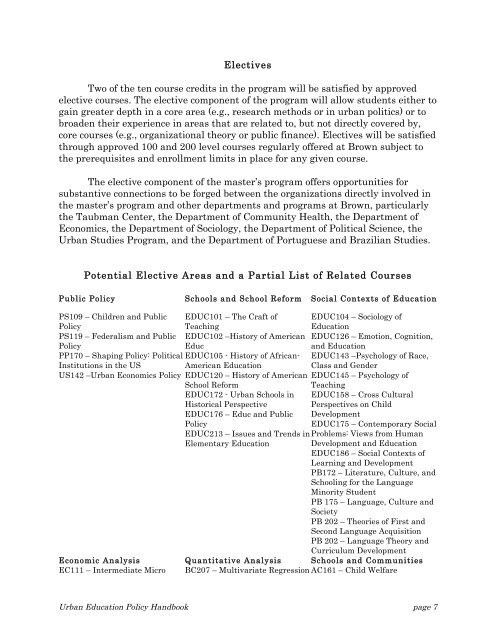UEP Handbook.pdf - Brown University
UEP Handbook.pdf - Brown University
UEP Handbook.pdf - Brown University
You also want an ePaper? Increase the reach of your titles
YUMPU automatically turns print PDFs into web optimized ePapers that Google loves.
Electives<br />
Two of the ten course credits in the program will be satisfied by approved<br />
elective courses. The elective component of the program will allow students either to<br />
gain greater depth in a core area (e.g., research methods or in urban politics) or to<br />
broaden their experience in areas that are related to, but not directly covered by,<br />
core courses (e.g., organizational theory or public finance). Electives will be satisfied<br />
through approved 100 and 200 level courses regularly offered at <strong>Brown</strong> subject to<br />
the prerequisites and enrollment limits in place for any given course.<br />
The elective component of the master’s program offers opportunities for<br />
substantive connections to be forged between the organizations directly involved in<br />
the master’s program and other departments and programs at <strong>Brown</strong>, particularly<br />
the Taubman Center, the Department of Community Health, the Department of<br />
Economics, the Department of Sociology, the Department of Political Science, the<br />
Urban Studies Program, and the Department of Portuguese and Brazilian Studies.<br />
Potential Elective Areas and a Partial List of Related Courses<br />
Public Policy Schools and School Reform Social Contexts of Education<br />
PS109 – Children and Public<br />
Policy<br />
PS119 – Federalism and Public<br />
Policy<br />
PP170 – Shaping Policy: Political<br />
Institutions in the US<br />
US142 –Urban Economics Policy<br />
EDUC101 – The Craft of<br />
Teaching<br />
EDUC102 –History of American<br />
Educ<br />
EDUC105 - History of African-<br />
American Education<br />
EDUC120 – History of American<br />
School Reform<br />
EDUC172 - Urban Schools in<br />
Historical Perspective<br />
EDUC176 – Educ and Public<br />
Policy<br />
EDUC213 – Issues and Trends in<br />
Elementary Education<br />
EDUC104 – Sociology of<br />
Education<br />
EDUC126 – Emotion, Cognition,<br />
and Education<br />
EDUC143 –Psychology of Race,<br />
Class and Gender<br />
EDUC145 – Psychology of<br />
Teaching<br />
EDUC158 – Cross Cultural<br />
Perspectives on Child<br />
Development<br />
EDUC175 – Contemporary Social<br />
Problems: Views from Human<br />
Development and Education<br />
EDUC186 – Social Contexts of<br />
Learning and Development<br />
PB172 – Literature, Culture, and<br />
Schooling for the Language<br />
Minority Student<br />
PB 175 – Language, Culture and<br />
Society<br />
PB 202 – Theories of First and<br />
Second Language Acquisition<br />
PB 202 – Language Theory and<br />
Curriculum Development<br />
Economic Analysis Quantitative Analysis Schools and Communities<br />
EC111 – Intermediate Micro BC207 – Multivariate Regression AC161 – Child Welfare<br />
Urban Education Policy <strong>Handbook</strong> page 7
















